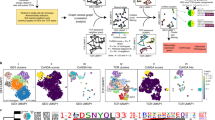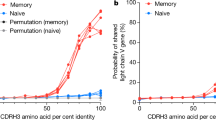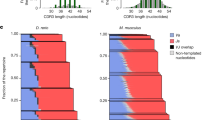Abstract
FOUR gene clusters have products that seem to participate in antigen binding on T or B lymphocytes. Three (the genes coding for the heavy and light chains of immunoglobulin molecules) are known to code for structural elements of B-cell receptors for antigen. There is evidence that a fourth group (the immune response genes associated with the major histocompatibility complex (MHC) locus) generates T-cell recognition structures for antigen1. No evidence exists that any of these four gene groups are linked. In a study of the T-cell receptors for antigen we used anti-idiotypic antibodies against specific T-cell receptors2: T and B cells specific for the same antigen were shown to express similar idiotypes2. Analogous findings using other systems and approaches have been reported3,4. Together these results strongly suggest that antigen-binding receptors on T and B lymphocytes at least in part make use of the same genetic material. Accordingly, T-cell receptors should at least partly be coded for by genes linked to “conventional” immunoglobulin gene groups. We prove here that idiotypic T-cell receptors with specificity for MHC antigens in the rat are coded for by genes linked to the heavy chain immunoglobulin genes.
This is a preview of subscription content, access via your institution
Access options
Subscribe to this journal
Receive 51 print issues and online access
$199.00 per year
only $3.90 per issue
Buy this article
- Purchase on Springer Link
- Instant access to full article PDF
Prices may be subject to local taxes which are calculated during checkout
Similar content being viewed by others
References
Katz, D. H., and Benacerraf, B. Transplant. Rev., 22, 175–210 (1975).
Binz, H., and Wigzell, H., J. exp. Med., 142, 197–211 (1975).
McKearn, T. J., Science, 183, 94–95 (1974).
Eichmann, K., and Rajewsky, K., Eur. J. Immun., 5, 661–667 (1975).
Bazin, H., Beckers, A., Vaerman, J.-P., and Heremans, J. F., J. Immun., 112, 1035–1041 (1974).
Wistar, R., Jr, Immunology, 17, 23–32 (1969).
Rokhlin, O. V., Vengerova, T. L., and Nezlin, R. S., Molekulyarnaya Biologiya, 4, 906–911 (1970).
Hämmerling, G. J., Black, S. J., Berek, C., Eichmann, K., and Rajewsky, K., J. exp. Med., 143, 861–869 (1976).
Munro, A. J., and Taussig, M., Nature, 256, 103–105 (1975).
Takemori, T., and Tada, T., J. exp. Med., 142, 1241–1253 (1975).
Binz, H., and Wigzell, H., Scand. J. Immun., 5, 559–571 (1976).
Binz, H., and Wigzell, H., Scand. J. Immun., 4, 591–600 (1975).
Schwartz, B. D., Kask, A. M., Paul, W. E., and Shevach, E. M., J. exp. Med., 143, 541–558 (1976).
Krawinkel, U., and Rajewsky, K., Eur. J. Immun. (in the press).
Author information
Authors and Affiliations
Rights and permissions
About this article
Cite this article
BINZ, H., WIGZELL, H. & BAZIN, H. T-cell idiotypes are linked to immunoglobulin heavy chain genes. Nature 264, 639–642 (1976). https://doi.org/10.1038/264639a0
Received:
Accepted:
Issue Date:
DOI: https://doi.org/10.1038/264639a0
This article is cited by
-
The gene encoding the T-cell receptor α-chain maps close to the Np-2 locus on mouse chromosome 14
Nature (1985)
-
Establishment of idiotypic helper T-cell repertoires early in life
Nature (1985)
-
Antigenic properties of T cell antigen-specific receptors isolated from the surface of rabbit and mouse spleen and lymph node cells
Folia Microbiologica (1985)
-
Genetic analysis of the non-H-2-linked Ir genes controlling the cytotoxic T-cell response to H-Y in H-2 d mice
Immunogenetics (1982)
-
Genetic chasing of T helper cell idiotype and allotype genes
Immunogenetics (1982)
Comments
By submitting a comment you agree to abide by our Terms and Community Guidelines. If you find something abusive or that does not comply with our terms or guidelines please flag it as inappropriate.



